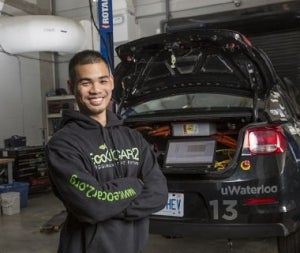Engineering
students
hope
to
build
a
smart
vehicle
that
understands
and
adapts
to
drivers’
habits
From
Waterloo
Stories, By
Jae
Doncillo
Imagine
a
car
that
could
actually
get
to
know
you.
Can’t
picture
it?
Mechanical
engineering
student
Kelvin
Law
is
working
to
change
that.
“Nowadays,
some
cars
have
sports
and
eco
modes,
but
that’s
still
just
two
options.
Imagine
a
car
that
optimizes
itself
for
each
unique
driver,”
says
Law,
a
graduate
student
in
the
Department
of
Mechanical
Engineering.
“With
this
smart
vehicle,
you
would
have
a
smartphone
app
to
log
all
your
driving
habits
-
how
much
you
drive,
how
aggressive
you
are
–
and
it
would
optimize
the
driving
experience
for
you.”

Optimal driving experience
The
technology
combines
a
smartphone
app
with
an
integrated
touchscreen
computer
in
the
car,
says
Law.
As
the
driver
operates
the
vehicle,
the
computer
records
data
ranging
from
pedal
position
to
driving
speed
and
range,
which
gets
stored
on
the
smartphone
app.
The
next
time
the
driver
starts
up
the
car,
the
app
feeds
the
recorded
driving
habit
data
back
into
the
car’s
computer,
and
the
computer
adjusts
the
car
accordingly
for
an
optimal
driving
experience.
A
conservative
driver
will
get
optimization
for
fuel
efficiency
while
the
car
will
adapt
for
maximum
performance
for
the
more
assertive
driver,
says
Law.
The
feature
is
not
only
an
advantage
in
future
competitions
it
could
have
huge
implications
for
the
industry
as
a
whole,
says
Law.
The
ultimate
goal
is
to
deploy
the
Adaptive
Vehicle
Control
Strategy
system
across
all
vehicles
as
a
standard
so
you
can
jump
into
any
vehicle
and
it
will
adjust
itself
to
the
driver’s
habits.
Hands-on experience
“UWAFT
is
the
only
student
team
that
gets
to
build
full-size
road-legal
vehicles.
They’re
actual
vehicles
that
we
drive
on
the
streets
regularly;
whether
it
is
an
on-road
test
we’re
conducting
or
just
going
down
the
street
to
get
parts,
”
says
Law.
“We’re
re-engineering
and
building
a
real
car.
“These
are
workplace
skills
you
learn
from
being
on
UWAFT
so
that
when
you
enter
the
workforce
with
major
automotive
manufacturers
and
suppliers
such
as
GM
or
Tesla,
you’re
that
much
more
prepared
because
you’ve
already
built
a
car.”
The
student
team
is
currently
competing
in
EcoCAR2,
an
engineering
competition
that
challenges
15
universities
across
North
America
to
reduce
the
environmental
impact
of
a
Chevrolet
Malibu
without
compromising
performance
and
safety.
UWAFT
placed
third
in
Year
1
of
the
EcoCAR2
design
competition.
In
2005,
UWAFT
placed
first
in
the
ChallengeX
competition
with
the
first
student-built
road-worthy
hydrogen
fuel
cell
vehicle.